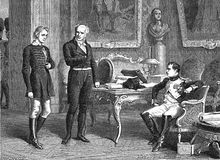Friedrich Stapß

Friedrich Staps (also Staps * 14. March 1792 in Naumburg (Saale) , † 16th October 1809 , possibly in Fünfhaus in Vienna ) was his attempt to assassinate Napoleon I known.
Stapß was the son of Magister Friedrich Gottlob Stapß, the pastor of the Lutheran Naumburg Othmarskirche , and learned the trade of a merchant. He got jobs in Erfurt and Leipzig . The strictly religiously educated young man saw the occupation of Napoleon as the sole reason for the need in Germany and became his bitter opponent. So he came up with the plan to kill the emperor.
In a message he left for his parents in Naumburg, he wrote: “I have to go, in order to save thousands from their destruction, from death, and then to die myself. What and how I want to do it, I am not allowed to discover yourself. ” Then he traveled to Vienna with borrowed money and from there on October 8, 1809 to Schönbrunn , where Napoleon was on October 12, shortly before the signing of the Peace of Schönbrunn , held a troop parade . General Rapp became aware of the young man who was trying to force his way through to the Kaiser and had him arrested. A large kitchen knife was found with him. The 17-year-old said that he had once been an admirer of Napoleon and fearlessly admitted his current intention of doing his fatherland and Europe a service by killing the emperor. When asked by the emperor “If I pardon you, how will you thank me?” Stapß replied with the words that exclude all mercy: “I will not kill you any less.” After a court martial he was sentenced on October 16 fusiled by a firing squad of the Württemberg infantry . At the place of execution he is said to have shouted: “Long live freedom! Long live Germany! Death to his tyrants! ” Napoleon, who did not want to believe in a single perpetrator, but initially suspected a conspiracy of the Illuminati , then “ activities in Berlin and Weimar ” , instructed his police minister Joseph Fouché to keep the matter secret. It was not until 1831 that the assassin's father received official confirmation of his son's death.
literature
- Louis Antoine Fauvelet de Bourrienne : The Minister of State. Or secret memoirs about Napoleon, the Directory, the Empire and the Restoration . Eighth volume , Friedrich Brodhag'sche Buchhandlung, Stuttgart 1830, pp. 139 ff.
- Constantin von Wurzbach : Staps, Friedrich Gottlieb . In: Biographisches Lexikon des Kaiserthums Oesterreich . 37th part. Imperial and Royal Court and State Printing Office, Vienna 1878, pp. 145–152 ( digitized version ).
- Bernhard von Poten : Stapß, Friedrich . In: Allgemeine Deutsche Biographie (ADB). Volume 35, Duncker & Humblot, Leipzig 1893, p. 461 f.
- August Fournier: Napoleon I, a biography . Volume 2, 4th edition, Vienna / Leipzig 1922, p. 307.
Individual evidence
Web links
- Roman Töppel: Staps (Stapss, Stapß), Friedrich . In: Institute for Saxon History and Folklore (Ed.): Saxon Biography .
- Detlef Behlau: Friedrich Staps and the Right to Resist (2009/10, with further references)
- Friedrich Staps (website with various primary and secondary sources in the wislicenus.info portal)
- Mathilde von Gellhorn, Friedrich Stapß, the preacher's son of St. Othmar zu Naumburg a. S.
| personal data | |
|---|---|
| SURNAME | Stapß, Friedrich |
| ALTERNATIVE NAMES | Staps, Friedrich |
| BRIEF DESCRIPTION | German assassin |
| DATE OF BIRTH | March 14, 1792 |
| PLACE OF BIRTH | Naumburg (Saale) |
| DATE OF DEATH | October 16, 1809 |
| Place of death | unsure: Vienna |